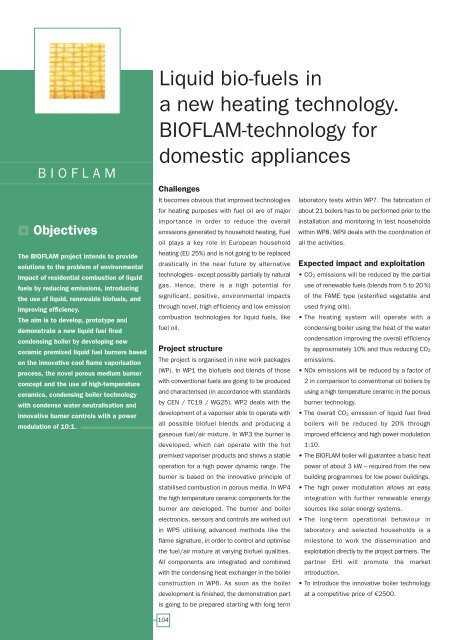European Bio-Energy Projects
European Bio-Energy Projects
European Bio-Energy Projects
You also want an ePaper? Increase the reach of your titles
YUMPU automatically turns print PDFs into web optimized ePapers that Google loves.
BIOFLAM<br />
Objectives<br />
The BIOFLAM project intends to provide<br />
solutions to the problem of environmental<br />
impact of residential combustion of liquid<br />
fuels by reducing emissions, introducing<br />
the use of liquid, renewable biofuels, and<br />
improving efficiency.<br />
The aim is to develop, prototype and<br />
demonstrate a new liquid fuel fired<br />
condensing boiler by developing new<br />
ceramic premixed liquid fuel burners based<br />
on the innovative cool flame vaporisation<br />
process, the novel porous medium burner<br />
concept and the use of high-temperature<br />
ceramics, condensing boiler technology<br />
with condense water neutralisation and<br />
innovative burner controls with a power<br />
modulation of 10:1.<br />
Liquid bio-fuels in<br />
a new heating technology.<br />
BIOFLAM-technology for<br />
domestic appliances<br />
Challenges<br />
It becomes obvious that improved technologies<br />
for heating purposes with fuel oil are of major<br />
importance in order to reduce the overall<br />
emissions generated by household heating. Fuel<br />
oil plays a key role in <strong>European</strong> household<br />
heating (EU 25%) and is not going to be replaced<br />
drastically in the near future by alternative<br />
technologies - except possibly partially by natural<br />
gas. Hence, there is a high potential for<br />
significant, positive, environmental impacts<br />
through novel, high efficiency and low emission<br />
combustion technologies for liquid fuels, like<br />
fuel oil.<br />
Project structure<br />
The project is organised in nine work packages<br />
(WP). In WP1 the biofuels and blends of those<br />
with conventional fuels are going to be produced<br />
and characterised (in accordance with standards<br />
by CEN / TC19 / WG25). WP2 deals with the<br />
development of a vaporiser able to operate with<br />
all possible biofuel blends and producing a<br />
gaseous fuel/air mixture. In WP3 the burner is<br />
developed, which can operate with the hot<br />
premixed vaporiser products and shows a stable<br />
operation for a high power dynamic range. The<br />
burner is based on the innovative principle of<br />
stabilised combustion in porous media. In WP4<br />
the high temperature ceramic components for the<br />
burner are developed. The burner and boiler<br />
electronics, sensors and controls are worked out<br />
in WP5 utilising advanced methods like the<br />
flame signature, in order to control and optimise<br />
the fuel/air mixture at varying biofuel qualities.<br />
All components are integrated and combined<br />
with the condensing heat exchanger in the boiler<br />
construction in WP6. As soon as the boiler<br />
development is finished, the demonstration part<br />
is going to be prepared starting with long term<br />
104<br />
laboratory tests within WP7. The fabrication of<br />
about 21 boilers has to be performed prior to the<br />
installation and monitoring in test households<br />
within WP8. WP9 deals with the coordination of<br />
all the activities.<br />
Expected impact and exploitation<br />
• CO2 emissions will be reduced by the partial<br />
use of renewable fuels (blends from 5 to 20 %)<br />
of the FAME type (esterified vegetable and<br />
used frying oils).<br />
• The heating system will operate with a<br />
condensing boiler using the heat of the water<br />
condensation improving the overall efficiency<br />
by approximately 10% and thus reducing CO2<br />
emissions.<br />
• NOx emissions will be reduced by a factor of<br />
2 in comparison to conventional oil boilers by<br />
using a high temperature ceramic in the porous<br />
burner technology.<br />
• The overall CO2 emission of liquid fuel fired<br />
boilers will be reduced by 20% through<br />
improved efficiency and high power modulation<br />
1:10.<br />
• The BIOFLAM boiler will guarantee a basic heat<br />
power of about 3 kW – required from the new<br />
building programmes for low power buildings.<br />
• The high power modulation allows an easy<br />
integration with further renewable energy<br />
sources like solar energy systems.<br />
• The long-term operational behaviour in<br />
laboratory and selected households is a<br />
milestone to work the dissemination and<br />
exploitation directly by the project partners. The<br />
partner EHI will promote the market<br />
introduction.<br />
• To introduce the innovative boiler technology<br />
at a competitive price of €2500.

















